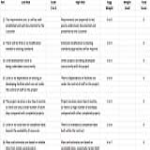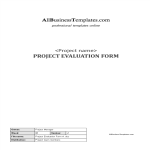Project Formative Evaluation template
Sponsored Link免费模板 保存,填空,打印,三步搞定!

Download Project Formative Evaluation template
Adobe PDF (.pdf)- 本文档已通过专业认证
- 100%可定制
- 这是一个数字下载 (5099.4 kB)
- 语: English
Sponsored Link
How to prepare
a Project Formative Evaluation? In what way is formative project evaluation carried out? Our template is designed to be easy to use and provides step-by-step instructions. It includes a checklist to help you assess the progress of your project and identify any areas where changes are needed Download this sample template now that will perfectly suit your
needs!
Project formative evaluation is an assessment process that takes place at the early stages of a project's development, typically before or during its implementation. The primary purpose of formative evaluation is to provide feedback and insights that can be used to shape and improve the project's design, planning, and implementation as it progresses. This type of evaluation is forward-looking and focuses on making necessary adjustments to ensure the project's success.
Key characteristics and objectives of project formative evaluation include:
- Feedback and Learning: Formative evaluation is primarily concerned with learning and making improvements. It provides ongoing feedback that can help project managers and stakeholders understand what is working well and what needs adjustments.
- Early Stage Focus: It is conducted during the early stages of a project's life cycle when changes are more manageable and cost-effective.
- Goal Alignment: Formative evaluation aims to ensure that the project's goals and objectives align with the needs and expectations of the target audience or community it serves.
- Quality Improvement: It identifies areas where the project may fall short in terms of quality, efficiency, or effectiveness and offers recommendations for improvement.
- Process Evaluation: In addition to assessing outcomes, formative evaluation also evaluates the processes and methods used to implement the project, helping to fine-tune procedures and approaches.
- Stakeholder Engagement: It often involves engaging with project stakeholders, including beneficiaries, staff, and partners, to gather diverse perspectives and insights.
- Iterative Process: Formative evaluation is an iterative process. Findings and recommendations from initial assessments can lead to changes in project design and implementation, followed by further evaluation.
- Risk Mitigation: By identifying potential challenges and risks early on, formative evaluation enables project managers to take proactive steps to mitigate them.
- Resource Optimization: It helps in optimizing the allocation of resources, including time, budget, and personnel, based on the evolving needs and circumstances of the project.
- Documentation: Documentation of the formative evaluation findings and recommendations is essential to guide future actions and to provide a record of how the project was shaped and adjusted.
- Flexibility: Formative evaluation allows for flexibility and adaptability, which can be crucial in dynamic project environments where conditions may change.
Project formative evaluation is often contrasted with summative evaluation, which takes place after the project has been completed to assess its overall impact and outcomes. Formative and summative evaluations together provide a comprehensive understanding of a project's lifecycle, from planning and development to implementation and results.
Download this
ready-to-use and easily customizable Project Formative Evaluation
template now!
DISCLAIMER
Nothing on this site shall be considered legal advice and no attorney-client relationship is established.
发表评论。 如果您有任何问题或意见,请随时在下面发布
相关文件
Sponsored Link




